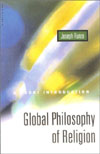Great Throughts Treasury
This site is dedicated to the memory of Dr. Alan William Smolowe who gave birth to the creation of this database.

Joseph Runzo and Nancy M. Martin
American Philosophy and Religion Professors, Authors and Co-Editors
"A human life can have meaning without an objective purpose, value, or pattern. We can construct our own values and purposes in a morally patternless world."
"Meaningful life is intimately tied to relationships, whether defined primarily in terms of human-divine or human-human relationships."
"The Buddha, that is now “Awakened One,” diagnosed the human condition in the following way. Life is out of balance and characterized by suffering because all things are impermanent, and yet we desire things as if they were permanent. We each view our own self as if it too were permanent and completely independent from our selves, and so we think of our self as competing for those things with other discrete selves. Everything that we desire will ultimately pass away – we cannot hold on to anything in the end, not even our own bodies and minds – so our inappropriate desires are frustrated and we suffer, only to be reborn again into anew life of desire and suffering. To break the cycle of rebirth (samsara), we must overcome our ignorance about the true nature of things, cut the root of desire, and give up attachment to self, for we are anatman, no-self."
"Jainism describes a world without a creator God in which human beings’ true nature as “energy, consciousness, and bliss” has been tarnished by karma. The free movement of life force toward its fulfillment in purity as the supreme value, upheld by an ethic of radical non-violence (ahimsa), characterized by a respect for the life force of all beings and a recognition of the fundamental interconnectedness of all… ignore this truth about interconnectedness endangers ourselves and the planet, whether we subscribe to the Jain worldview or not."
"To study Torah is to touch the mind of God, so study becomes an act not only of knowing God but of devotion to God, and as such it is the most intimate form of love. On the other hand, in practice Torah is embodied in everyday life which is imbued with sacredness through ritualization… both these dimensions of study and ritual Torah is said to increase life, enriching and filling it with meaning, and quite literally lengthening it."
"There is no one Hindu view of life or meaning, but rather multiple centers of meaning, belief and practice, all legitimately called Hinduism, and all connected yet radically different… Fundamentally, life and self-identity are seen as fluid, marked by impermanence, while ultimately there is an Absolute Oneness into which all the distinctions between multiple forms of the divine, the world, and human beings dissolve"
"The purpose of human life does not have to be some end-state which terminates the process of human life. It may well lie in the process itself."
"The Taoist solution was to get oneself in harmony with the Way or Tao of the universe, to learn to move through the world with flexibility and fluidity according to the nature of things, rather than fighting it, ourselves, or other people."